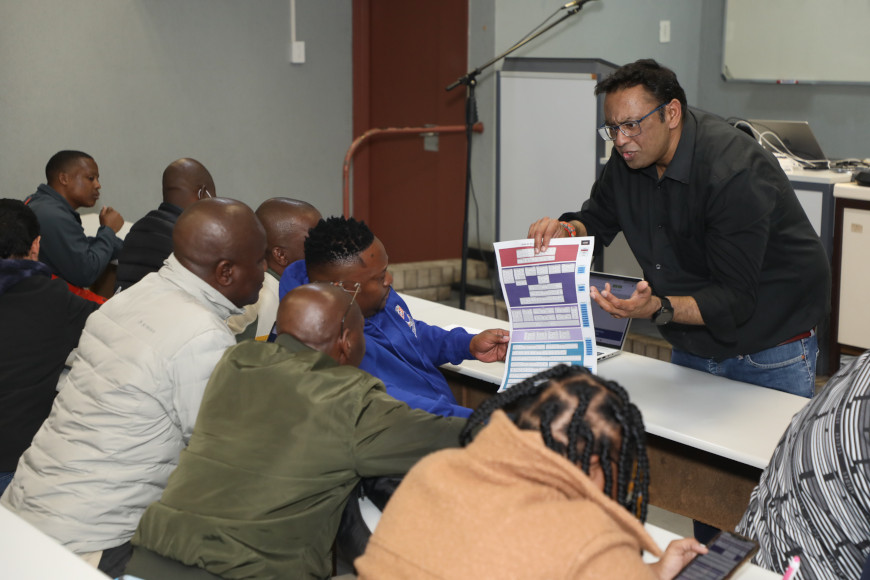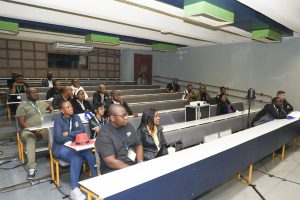The much-anticipated National Annual Technology Event (NATE) was hosted by the Durban University of Technology. Pre-NATE skills development opportunities and special interest group meetings kicked off on 7 July, with the main event occurring from 8 to 10 July 2025.
Day one looked at the dynamic training session by Mr Shannon Naidoo, Chief Technology Officer at Chebelo Pele Consulting. He focused on key objectives for the training with attendees from various universities from around South Africa, introducing the practice of Business Architecture to the audience. He shared on the development of the enterprise architecture functions/practice at universities in South Africa. He emphasised on the quality of ICT delivery especially on transformative projects in this sector. He also delved into coaching and mentoring young professionals as well as introducing the concepts of Enterprise architecture (EA )as a service to this community of professionals.
Naidoo explained that sharing on Enterprise Architecture as a service is vital to the university key roles players who were in attendance.
“Enterprise architecture as a practice is taught as a subject in Computer Science in most universities today. However, the elements of driving organisational wide change are not easily presented in a practical way, informed by real world professional case studies. There is an opportunity to not only educate but transform the practice of Enterprise Architecture in institutions which is shown to have a direct bearing on the quality of ICT decision making and hence the achievement of 2030 objectives including Digital Transformation. Strong leadership in these areas are almost a necessity to minimise wasteful practices in ICT investment and propel the achievement of those digital transformation objectives much faster. This is not a panacea but certainly contributes to an overall performance improvement in ICT functions,” he said.
He indicated further that Enterprise Architecture as a service is relatively new with adoption coming along as companies realise they don’t have to only grow these skills organically and can leverage partners in industry to assist with bootstrapping the development of their practice.
Sibongile Zuma, a Desktop consultant from the Durban University of Technology (DUT) Riverside Campus said that It was her first time attending such an event.
“According to the lectures that we had, one can say it was excellent to learn something new that one can adopt to my work environment. Enterprise Architecture is a great strategic framework that we can use as DUT as well; it can improve how we solve our problems or how we tackle them, as the first speaker said,” you can transform questions into answers,” she said.
CPUT’s Alvino Moses echoed his sentiments upon attending the training session, saying that the introductory session focused on corporate environment and discussed the different Enterprise Architecture frameworks and how one can map this into different projects. “The session was more practical and engaging as the presenter has experienced both the private and higher education sector and draw comparisons between the two domains,” he added.
On the day two of the conference in his opening address, on behalf of the Deputy Vice-Chancellor: Research, Innovation and Engagement, Professor Fulufhelo Nemavhola, Acting Chief Information Officer at DUT Professor Mohohlo Tsoeu, warmly welcomed the guests and emphasised the importance of partnerships between industry, academia, society, and government. He delivered an engaging presentation on the digital transformation and its challenges.
Professor Tsoeu reflected on the words of one of his favourite scholars, Max Neef where he stated that every generation has its own language, and what is important is that this language aligns with the grand challenges of time.
He said that what is often overlooked in the global trends and agendas is the time to pause and reflect on the context, grand challenges, while sharing with the world, which is unique. He also added that South Africa is grappling with inequality.
He also discussed the importance of partnerships between industry, academia, society, and government. He emphasised that this partnership is crucial because, at its core, it is about improving human life. Therefore, as champions of technology, education, and industry leaders, they must not forget the importance of this partnership.
He encouraged the leaders to adopt a people’s first technology approach rather than a technology first approach.
“If we prioritise technology over people, we risk repeating the mistakes of the past, where scientific progress was built on unethical experimentation and exploitation. The harm caused by technology might not be as obvious, except for cybersecurity issues,’’ he explained.
Dr Creswell Du Preez; ICT Advisor delivered a keynote speech on Assessing Digital Competence in Universities. He said as the world becomes increasingly digital; it is essential for individuals to develop the necessary skills to navigate the online world.
However, he stressed out that many people in South Africa are struggling to keep up with the rapid pace of digital transformation. He stated that one of the main challenges is the lack of digital literacy.
“Many individuals are being encouraged to go digital without adequate preparation or support. This can lead to frustration and potential security risks.’’ he explained.
He added that the previous introduction of digital platforms, such as the South African Social Agency (SASSA) gold card for the elderly, has highlighted the need for digital literacy training.
“Without proper guidance, individuals may struggle to use these platforms effectively and safely.’ he added.
To address these challenges, Dr Du Preez said it is essential to provide individuals with the necessary skills and support to navigate the digital world. This includes digital literacy training, technical support, and clear communication.
Dr Du Preez underlined that by investing in digital skills development, South Africa can empower its citizens to take advantage of the opportunities offered by digital transformation. Also, take a proactive approach to addressing the digital divide and ensuring that everyone has the skills they need to succeed in the digital age.
Day three also saw an engaging presentation from various presenters exploring different aspects within the information technology spheres. Amongst presenters on the day was the Senior Analyst at DUT, Prichard Mooketsi who delved into Business analysis and Systems Analysis in Higher Education, and the challenges, success and recommendations.
At the conference ending, Val Theron, Higher Education Information Technology South Africa (HEITSA) CEO extended her sincere gratitude to DUT for hosting the event and to all the individuals who contributed to its success. She praised the presenters for their engaging presentations and thanked them for sharing their knowledge and insights.
“I would like to send a special thanks to DUT for hosting us. They deserve a huge round of applause for their dedication. To the presenters, thank you guys were awesome, your presentations were on point, and I am sure that you learned a lot from each other so thank you very much,’’ she concluded.
The 2025 NATE conference concluded on a celebratory note, with an award ceremony, quiz games, and competitions that brought attendees together that shared skills development opportunities.
Pictured: Attendees at the NATE conference.
Vukani Langa/Waheeda Peters


